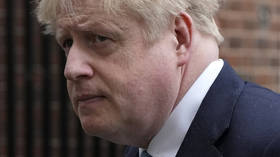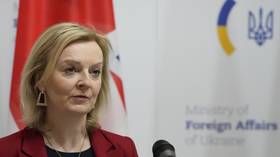Boris Johnson sets out ‘6-point plan for Ukraine’

The British Prime Minister, Boris Johnson, has set out his six-point “plan for Ukraine,” arguing that while this is “not a NATO conflict,” the international community should do more to support Kiev as it faces the “Russian aggression.”
Moscow does not consider its attack on Ukraine as an act of aggression saying that its “special military operation” aiming to “demilitarize” and “denazify” Ukraine, to protect Donbass and to defend Russia’s own security amid NATO’s expansion eastward.
In a guest essay for The New York Times, published on Sunday, Johnson said that “Vladimir Putin’s act of aggression must fail and be seen to fail.” He stressed that the Kremlin should not be allowed “to get away” with misrepresenting the intentions of the West “in order to find ex post facto justification for this war of choice.”
“This is not a NATO conflict, and it will not become one. No ally has sent combat troops to Ukraine,” Johnson wrote.
This remark follows similar statements of the alliance Secretary General Jens Stoltenberg and Germany’s Chancellor Olaf Scholz.
Johnson added that the Western nations “have no hostility toward the Russian people,” and “no desire to impugn a great nation and a world power.”
However, the British prime minister argues that the US and Europe have not done enough for Ukraine. Moreover, he says that the West has failed “to learn the lessons of Russian aggression” and “for too long” has “turned the other cheek.”
He provided several examples of the “aggression:” conflict in Georgia in 2008, events in Ukraine in 2014 and the alleged poisoning of Sergey Skripal and his daughter Yulia in Salisbury in 2018.
“It is now clear diplomacy never had a chance. But it is precisely because of our respect for Russia that we find the actions of the Putin regime so unconscionable,” Johnson wrote.
Therefore, the prime minister argues, the international community must move from talks to concrete actions. The first point of Johnson’s “plan for Ukraine” is mobilization of “an international humanitarian coalition” with a view “to establish an immediate cease-fire and allow civilians safe passage, food and medical supplies.”
As a second point he suggests better coordinating the efforts in providing Ukraine with defensive equipment.
“Third, we must maximize the economic pressure on Mr. Putin’s regime. We must go further on economic sanctions, expelling every Russian bank from SWIFT and giving our law enforcement agencies unprecedented powers to peel back the facade of dirty Russian money in London,” he said.
Johnson also called on the partners to prevent “any creeping normalization of what Russia does in Ukraine,” arguing that “Russia's invasion in Georgia” in 2008 and “seizure of Crimea” in 2014 demonstrate that “the results of Russian aggression merely encourages more aggression.”
The West should remain open to diplomacy, but it is for Ukraine to make the decisions on any political settlement, Johnson said.
And, finally, the prime minister stresses that Euro-Atlantic security must be strengthened. This, in his opinion, should include not only bolstering NATO’s eastern borders but also supporting non-NATO countries allegedly facing the risk of Russian aggression.
“And those that participate or enable Russian aggression, such as Belarus, will be subject to maximum sanctions,” the UK prime minister said.
Johnson will be presenting his plan to Britain’s allies in the coming days, Downing Street said on Saturday evening.
Russia argues that it has exhausted all the diplomatic options prior to the military operation launch. Many Western countries responded to the offensive by imposing severe sanctions on Moscow.
On February 27 Russia put its nuclear forces on high alert, later explaining this decision by citing UK Foreign Minister Liz Truss’ “unacceptable” remarks about the potential risk of conflict between NATO and Russia over situation in Ukraine.













